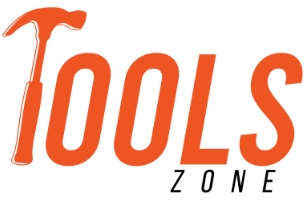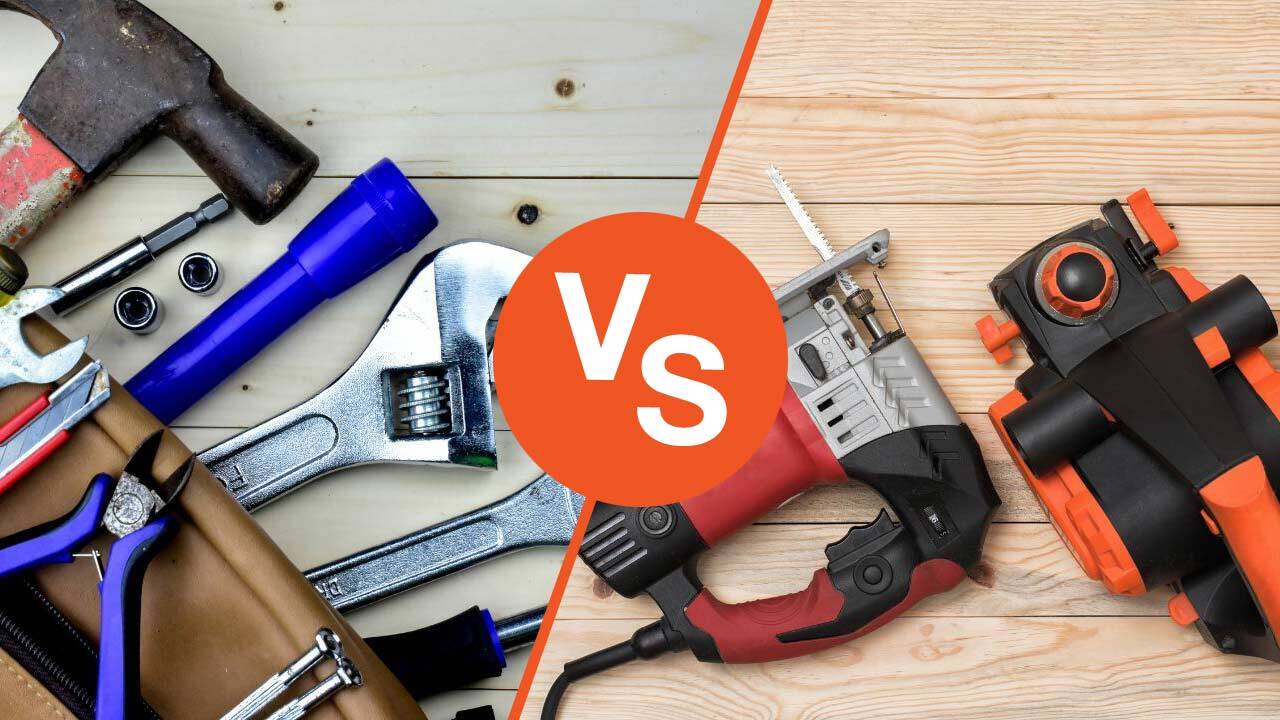Imagine a typical workshop, where on one side, you have skilled artisans wielding hand tools with precision, each movement guided by years of practice. On the other side, modern marvels of technology as power tools effortlessly cut through materials. It’s a clash of old traditions and new innovations, a tale of choosing between the tried-and-true and the cutting-edge. The debate between hand tools and power tools is still going strong. Both kinds of tools help you get things done quicker and with less effort, and they also help you make fewer mistakes.
So, What is the difference between hand tools and power tools?
The difference between hand tools and power tools are – “Hand tools are operated by manual effort and encompass a variety of examples, including hammers, screwdrivers, wrenches, and more. Conversely, power tools are characterized by their reliance on electrical power and consist of equipment such as drills, saws, and sanders.”
Hand Tools vs Power Tools: Pros and Cons
Pros of Hand Tools:
- Enhanced Control
Hand tools offer you a level of control that’s hard to match. When you use a hand tool, you’re the one in charge of the speed and power. Unlike power tools that have a fixed speed, hand tools allow you to adjust your actions to match the task’s requirements. This precision can help prevent overworking or damaging delicate materials.
- Finer Workmanship
Hand tools excel in producing intricate and detailed work. Craftsmen have used hand
tools to create exquisite designs long before power tools came along. The finesse and precision achievable with hand tools make them a preferred choice for tasks that demand a high degree of accuracy and artistry.
- Cost-Effective
In terms of cost, hand tools often come out ahead. They are generally more affordable to purchase than power tools, making them an excellent option for those on a budget. Building up a collection of hand tools can be done at a fraction of the cost required for assembling an equivalent set of power tools.
- Safety
Hand tools prioritize safety. Since they don’t involve electricity or high-speed moving parts, they tend to be safer to use compared to power tools. Moreover, the fine-tuned control offered by hand tools allows you to stop the tool quickly if needed, reducing the risk of accidents.
- No Dependency on Electricity
One major advantage of hand tools is their independence from electricity. They don’t require batteries or power outlets, allowing you to work anytime and anywhere. This freedom from needing a power source makes hand tools convenient and versatile for various work settings.
- Lightweight and Maneuverable
Hand tools are designed to be lightweight and easy to handle. Without the burden of heavy batteries or electronic components, they are agile and can be used in tight spaces. This feature is especially valuable for tasks that demand precision in confined areas.
- Delicate Material Handling
When dealing with delicate and lightweight materials, hand tools offer a gentle touch. These tools, such as hand-operated screwdrivers and precision pliers, minimize the risk of unintended damage. This is especially critical in situations where fragility is a concern, as power tools might apply excessive force that could lead to splitting or breakage.

- Essential Toolbox Components
Hand tools are the foundation of any contractor’s toolkit. Tools like hammers, wrenches, and screwdrivers are indispensable for a wide array of tasks. They serve as the go-to tools for day-to-day construction and renovation needs, offering versatility and practicality that power tools might not always provide.
Cons of Hand Tools
- Lack of Speed
Hand tools are notably slower compared to power tools. For instance, cutting through wood with a hand saw takes much more time than a circular saw would. If time efficiency is crucial, hand tools might not be the best choice as they tend to prolong tasks.
- Physical Effort Required
Unlike power tools that automate tasks, hand tools require manual effort. This can lead to significant physical strain, depending on the task. While some hand tools are less demanding, others can be quite strenuous, making it necessary to consider the physical aspect when planning projects.
- Limited Versatility
Hand tools are generally less versatile than power tools. For example, a hand saw has a single blade for a specific type of cut, while power tools can switch out blades and adjust angles, broadening their range of applications.
Pros of Power Tools
- Speed
Power tools are the go-to choice for many projects. They work fast, making tasks quicker. Imagine cutting wood – a power tool does it faster than a hand saw. This is great for professionals who need to finish jobs on time.
- Accuracy
Power tools are very precise, especially with laser guides. They help you do things perfectly. Think of a table saw – it guides you, and you get a perfect cut in seconds. Power tools are less likely to mess up your work.
- Less Effort
Compared to hand tools, power tools need less physical effort. Doing tasks like cutting wood with power tools is much easier than doing it by hand. This is a big advantage, especially when you’re tired or have a lot to do.
- Electrical Power
Power tools use electricity to work. Some have batteries, others plug into outlets. This means they keep going without stopping. They’re great for tough jobs or tasks you do a lot. They save time and energy.

Cons of Power Tools
- Messiness
Power tools can create a significant amount of mess, scattering debris during use. For example, a power sander can produce fine dust that covers your workspace if not controlled properly, especially in small areas.
- Limited Control
Controlling power tools effectively requires experience. Novices might struggle to manage the power, leading to potential mishaps. Some power tools can be overly powerful for beginners, causing issues.
- Costs
Certain power tools can be expensive, especially specialized ones. This might not fit everyone’s budget. While budget-friendly options exist, the cost disparity between power and hand tools should be considered.
- Safety Concerns
Power tools pose higher safety risks than hand tools. Misuse can lead to more damage and injuries. Adequate training and caution are necessary for safe operation.
Moreover, power tools are heavier and more complex, increasing the risk of accidents. They also come with higher costs due to their design and maintenance needs. However, renting tools can be a cost-effective solution compared to purchasing, helping you avoid upfront expenses and maintenance costs.
Things To Consider When Choosing Between Hand Tool and Power Tool
Deciding between hand tools and power tools depends on what you need and prefer. Here are some things to consider:
- Repetitive Tasks: If you have to do the same task many times, power tools are faster. For example, a circular saw can make consistent cuts quickly.
- Deadline: If time isn’t a rush, hand tools let you enjoy the process. But for pros with tight deadlines, power tools speed things up.
- Dust Control: Power tools make more dust. If you lack good dust extraction, hand tools might be safer, as they create a less airborne mess.
- Hand-Finished Quality: Handwork can give a project a unique touch, but it takes longer. Power tools can feel mechanical, so hand tools offer character.
- One-Time Tasks: For single jobs, hand tools can be quicker. Setting up power tools might take more time than doing the task by hand.
- Cost Consideration: While hand tools are often cheaper, budget power tools are affordable too. If you’ll use power tools frequently, they can be cost-effective in the long run.
Frequently Asked Question
Why hand tools are usually nonmechanical?
Hand tools are usually nonmechanical because they are simpler, more affordable, and more durable than mechanical tools. Mechanical tools have moving parts that can break or wear out, while nonmechanical tools have fewer moving parts and are therefore less likely to malfunction.
Can hand tools be recycled?
Yes, hand tools can be recycled. Most hand tools are made of metal, which can be recycled at a scrap metal yard. Some hand tools may also have wooden handles, which can be composted or recycled at a hazardous waste facility.
Our Takeaway
To me, both kinds of tools are important. The secret is knowing when to use each one. That helps you pick the right tool for the job you’re doing. Think about your project’s needs and your comfort. The gap between hand tools and power tools is narrower than you might expect.










Leave a Comment